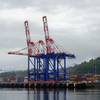As maritime regulators in various countries prepare to implement the ISPS Code rigorously, with effect from next Thursday, analysts are watching shipping security developments closely. Recent reports from the International Chamber of Commerce, which publishes a weekly newsletter on global maritime piracy, indicate a spate of attacks over the last three weeks in Senegal, Cameroon, the Malacca Straits and Indonesia. Such attacks are nothing new: nor is the loss of life amongst ill-fated seafarers, caught in the wrong place at the wrong time.
July 1st also heralds the first deadline for the installation of Ship Security Alert Systems on board more than 40,000 of the world’s ocean-going cargo and passenger ships. Under amendments to the SOLAS Convention, crude oil, chemical and gas tankers as well as bulk carriers will be required to install such systems by the time they undergo the first radio survey after the beginning of July. Other cargo ships such as container vessels, general cargo ships and ro/ros will be required to put such systems on board by the first radio survey after July 2006.
The international maritime security net is tightening all the time. The US Coast Guard is planning to track electronically all cargo vessels approaching the country’s ports for four days prior to their arrival and is preparing to extend IMO’s ship security regulations to classes of domestic vessels such as Great Lakes traders, passenger ships and smaller vessels of less than 500 gross tons, not included for the moment in the IMO’s regulations. Meanwhile, in the UK, the Maritime and Coastguard Agency is likely to impose new security regulations on passenger ships and domestically trading tonnage once the first July 1st deadline has been and gone.
The new maritime security backdrop, however, demonstrates many contrasts. On the one hand, the US, Canada, Australia, New Zealand, Singapore and some European countries are planning to enforce the new regulations from day one. But other countries appear remarkably laid back, presumably believing that world trade will go on, come what may. However, considering that their port facilities and ship repair yards could be blacklisted if security arrangements there are deemed inadequate, this appears to be a remarkably cavalier attitude. Ships calling at such facilities risk being delayed, detained or even refused entry in other countries’ marine terminals. The stakes are very high indeed.
The fact that maritime nations have different standards when it comes to enforcing regulations is a major concern for ship owners. This week, the European Court of Justice decided that France had failed in its duty to inspect a minimum of 25% of foreign ships entering its ports between 1999 and 2001 although French Government officials have since claimed that 30% of ships were inspected in 2003 and at least 25% are likely to be inspected in 2004.
However, this lack of compliance in a leading north European maritime nation does beg questions over enforcement of the ISPS Code. Have the ports and repair yards in France, often located in the middle of the country’s bustling cities, really responded to the spirit of the ISPS Code? Have they been made secure in the way that the ISPS Code envisages, prior to the July 1st ISPS deadline? Have certificates been issued only upon confirmation that proper procedures have been established? And, if US authorities decide to pick on a couple of facilities at random, what then?
The IMO finally admitted this week that the Code’s deadline will not be met by about a third of all vessels and more than 80% of world port facilities. Figures for ship repair yards are not yet available … but you have been warned!
Featured videos

Inside the Electrified Truckable Tug

Inmarsat Enhances Service to Drive Digitalization

Tracking Foreign Vessels Working in the U.S. Jones Act Market
Subscribe for
Maritime Reporter E-News
Maritime Reporter E-News is the maritime industry's largest circulation and most authoritative ENews Service, delivered to your Email five times per week









